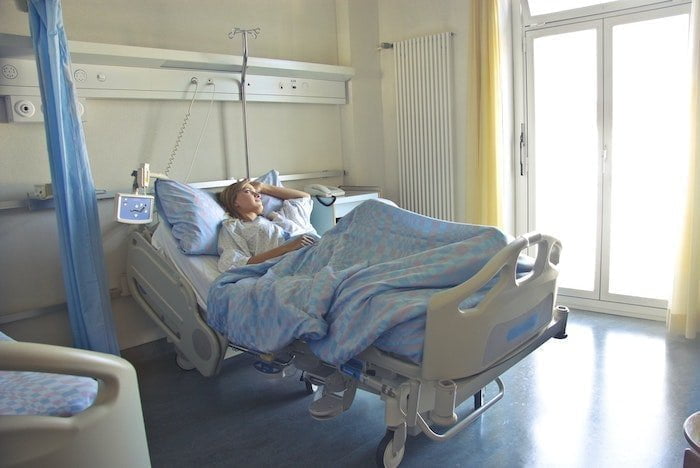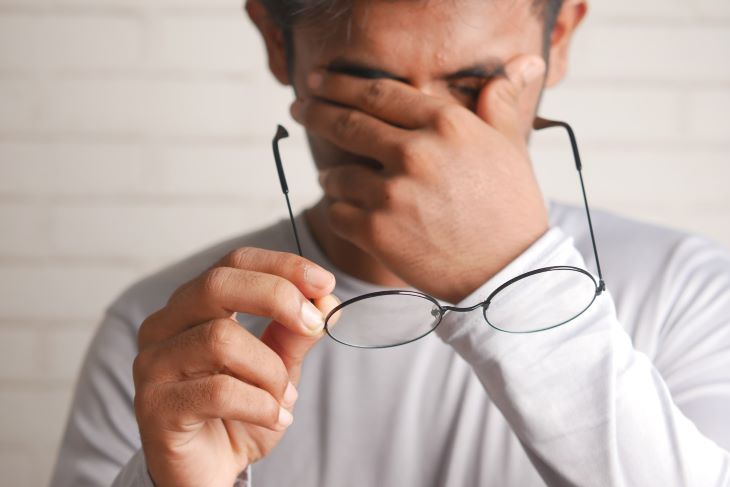The Effects of Alcohol on the Body
Quick Links for the Effects of Alcohol on the Body
- Effects of alcohol on the body: The Brain
- Effects of alcohol on the body: The Heart
- Effects of alcohol on the body: The Stomach
- Effects of alcohol on the body: The Liver
- Effects of alcohol on the body: The Bladder
- Effects of alcohol on the body: The Lungs
- Effects of alcohol on the body: The Pancreas
- Effects of alcohol on the body: The Gut
- Effects of alcohol on the body: The Reproductive Organs
- Effects of alcohol on the body: The Kidneys
- References for the effects of alcohol on the body
Alcohol consumption has an effect on nearly every organ in the body.
These can range from minor impacts to severe, even deadly conditions.
On this page, we go through every part of the body which is affected by alcohol and explain how they are affected.
Alcohol and the brain

Man holding his head suffering from the effects of alcohol on the body
Alcohol is a depressant. One of the things it slows down is brain activity.
It does so by inhibiting the production of certain neurotransmitters, such as GABA and glutamate.
In the very short term, this can make people less anxious, since it acts as a minor sedative.
However, as time passes, alcohol continues to slow down the activity of the brain. Eventually, this can prove dangerous.
In extreme cases, people can drink themselves into a coma.
Another short-term effect of alcohol is memory loss. Heavy drinkers often find that they are unable to remember things that happened very recently, especially if they were drinking at the time.
In the long term, persistent alcohol use can cause brain damage. This generally takes the form of chronic memory loss and difficulty learning new information.
There is also a specific brain condition that is caused by long-term alcohol use, called Wernicke-Korsakoff Syndrome. Symptoms of Wernicke-Korsakoff Syndrome include:
- Confusion
- Changes in vision
- Leg tremors.
Wernicke-Korsakoff Syndrome is largely incurable.
Alcohol and mental health
As well as causing brain damage, alcohol also aggravates mental health problems such as anxiety and depression.
It does so by disrupting the normal balance of chemicals and hormones in the brain.
It trains the brain to produce ‘happiness hormones’ like dopamine only when alcohol is present. So, when a person is not drinking, they feel worse.
Alcohol and the heart

Two people discussing the effects of alcohol on the body
Drinking alcohol in large quantities in a short space of time can raise your blood pressure and make your heartbeat more irregular.
This puts you at greater risk of a heart attack or stroke, especially if you are already at risk due to age or a pre-existing heart condition.
Binge drinking can also lead to hypertension, which is a condition whereby the pressure in the blood vessels is higher.
This means that the heart has to work harder to pump blood, which in turn raises the risk of a heart attack or stroke.
Whilst older people are most at risk of heart attack or stroke, these heart problems can also affect the young, especially if they drink or use drugs or have an underlying heart condition.
Alcohol increases the stress on the heart. Over years of drinking, this can lead to a variety of heart complaints, among them irregular heartbeat, hypertension and cardiomyopathy.
All of these conditions are risk factors that increase the likelihood of strokes and heart attacks.
Alcohol and the stomach

Friends discussing the impact of alcohol on the body
Drinking alcohol increases the rate at which your stomach produces acid. This can lead to gastritis or inflammation of the lining of the stomach.
The symptoms of gastritis include vomiting, stomach pain, diarrhoea and bleeding. You are also more at risk of developing stomach ulcers and heartburn if you drink a lot.
Over a lifetime of drinking, the extra acid produced by the stomach can cause chronic alcohol gastritis.
This is where the lining of the stomach is permanently damaged.
Symptoms of chronic gastritis include: [2]
- Severe stomach pain
- Indigestion
- Feeling bloated
- Nausea
- Bleeding in the stomach
- Increased risk of stomach ulcers
Alcohol and the liver

Friends discussing the impact of alcohol on the body
The impact of alcohol on the liver has been documented for some time now.
We know that alcohol is one of the biggest contributors to liver disease, [3] ranging from fatty liver disease all the way to cirrhosis.
Fatty liver disease is simply a build-up of fat on the liver.
This can happen after even a few drinking sessions and is relatively harmless and reversible in small doses.
However, other alcohol-related liver diseases can be far more deadly.
Alcoholic hepatitis occurs when the liver becomes inflamed and liver tissue starts to be destroyed. Depending on the degree of progression, alcoholic hepatitis can be reversible with abstinence and a careful diet.
Alcoholic cirrhosis refers to an advanced form of liver disease where the liver ceases to function as it should.
Cirrhosis is generally irreversible and can lead to death if the drinker continues to drink.
One of the big perils where alcohol and the liver are concerned is that someone who is relatively young can still develop a serious disease such as alcoholic hepatitis or even cirrhosis.
These diseases are not limited to those with a lifetime of drinking behind them.
Alcohol and the bladder

Inpatient and health worker at rehab discussing the impact of alcohol on the body
Alcohol is a diuretic, which means that it makes you urinate more.
It also dehydrates you, which means your urine can appear a darker yellow/brown as opposed to a light yellow.
This highly concentrated urine can have a negative impact on your urinary tract, by inflaming the lining of the bladder.
It can also raise your chances of developing a Urinary Tract Infection (UTI). [4]
UTIs are characterised by painful spasms in the urethra and bladder, as well as feeling like you have to urinate even after you have just urinated.
They often lead to very dark, smelly urine, as well as symptoms like back pain, headaches and fever.
In the long run, drinking too much alcohol can damage the nerves, which in turn causes difficulties urinating.
Alcohol and the lungs

Medical worker taking notes whilst speaking with a person about the impact of alcohol on the body
There are a few different ways in which alcohol harms the lungs.
First of all, alcohol weakens the immune system, which means that the body is less able to fight off lung infections.
Secondly, alcohol damages the cells inside the lungs, which means the lungs are less capable of getting rid of toxic things which are accidentally inhaled.
When in vapour form, alcohol can damage the nasal passages and sinuses. This makes them inflamed and reduces their ability to stave off infection.
Another way in which alcohol harms the lungs is by weakening the gag reflex. The gag reflex is important because it helps us to get rid of foreign objects that enter the lungs, such as liquids, spit or food.
If the gag reflex isn’t working, these things can enter the lungs and cause infections.
Alcohol kills some of the good bacteria we have in our throat and mouth, which opens the door for other bacteria to grow there.
Those bacteria can then cause problems, especially when inhaled into the lungs.
In the long run, alcohol use can also have an effect on immune cells which protect the respiratory system from infection.
This leaves the lungs and body more in danger of contracting conditions such as TB, pneumonia and Acute Respiratory Distress Syndrome (ARDS). [5]
Alcohol and the oesophagus
Alcohol can irritate the oesophagus in the short term due to acid reflux, which is where gastric acid is unable to be cleared.
In the long term, damage to the oesophagus can build up, making it harder to swallow.
This can also cause chest pain.
Alcohol and the pancreas

Medical worker taking notes whilst speaking with a person about the impact of alcohol on the body
In the short term, alcohol use can make the pancreas inflamed.
Although the precise mechanism by which this occurs is not fully understood, one explanation put forward by scientists is that alcohol makes enzymes in the pancreas start to digest the pancreas itself. [6]
Binge drinking is one of the many causes of acute pancreatitis.
The symptoms of acute pancreatitis include pain in the abdomen, as well as vomiting and nausea.
In the long term, pancreatitis can become chronic if the pancreas is routinely inflamed. Chronic pancreatitis is characterised by severe, long-lasting pain in the abdomen.
Other symptoms include:
- Weight loss
- Jaundice
- Lack of appetite
- Symptoms of diabetes
- Nausea
Alcohol and the gut

Person speaking about the impact of alcohol on the body
Alcohol can erode the intestine and cause bleeding in the gut.
This can happen to anyone who binge drinks, regardless of health, age and other risk factors.
Alcohol has several effects on the body which make it harmful to the gut. [7] It aggravates the stomach, due to excess production of stomach acid.
It inflames the gastrointestinal tract and makes the body absorb less water.
It also accelerates digestion in the large intestine, which can lead to diarrhoea. If the digestive tract is irritated, diarrhoea is even worse.
Over time, the small intestine can be damaged by alcohol consumption. One way in which this happens is through the stomach being impaired.
Normally, the stomach destroys nearly all harmful bacteria which pass through it.
However, when the stomach is not functioning properly due to conditions like chronic gastritis, this means that bacteria can pass into the small intestine, and then into the bloodstream. This is highly dangerous and can cause infections in all organs of the body, including the brain and liver.
Alcohol and the reproductive organs

People holding hands whilst discussing the effects of alcohol on the body
Alcohol can affect the reproductive organs in a number of ways.
First of all, there is a link between alcohol and infertility, with long-term drinking likely to reduce fertility dramatically in some people. [8]
There is also a link between alcohol and erectile dysfunction. Sex hormones are key to getting an erection (and sustaining it).
When you drink, your body releases fewer sex hormones, which leads to erectile dysfunction.
In women, there are also reproductive problems that go hand-in-hand with long-term drinking. Long-term drinking can interfere with the menstrual cycle, and even cause it to stop completely.
It can also lead to infertility in women. Some long-term drinkers go into menopause at an early age.
In men, long-term drinking can cause the testicles to shrink. It can also cut down the body’s production of testosterone, which can bring about infertility and impotence. [9]
Alcohol and the skeletal system

Patient lying in a hospital bed suffering from the effects of alcohol on the body
Over time, chronic alcohol use can stop your body from being able to maintain bone strength.
This condition is called osteoporosis. It means that your bones will get thinner, which can leave you at risk of a fracture.
If you do get a fracture, it will also take longer to heal.
The effect of alcohol on the bones is especially problematic for young people, whose bones are still developing, and whose bodies are storing calcium in order to keep the bones healthy.
It is also problematic for people in the latter stages of life, as their bones tend to be weaker and a fracture more difficult to get over.
Alcohol and the skin

Doctor researching the effects of alcohol on the body
Alcohol inflames skin tissue, which can make skin look red and blotchy after drinking. This is due to blood vessels under the skin widening.
Alcohol also leads to poor sleep, as it shortens the REM (Rapid Eye Movement) stage. Someone with poor sleep is likely to have dark circles under their eyes.
Alcohol dehydrates you, which damages the skin, leaving it dry and flaky.
Over time, it can also lead to premature ageing. If you have wrinkles or dryness, these conditions are likely to be exacerbated by drinking alcohol.
Alcohol also tends to contain a lot of sugar, which can have an effect on your skin. It can make your complexion duller, and make you more at risk of acne.
If you have rosacea, this is also likely to flare up when you drink alcohol.
In the long run, alcohol can cause the blood vessels to dilate permanently.
This can make the face permanently red, and cause spider veins to develop.
Long-term alcohol use also increases the risk of psoriasis, a condition characterised by flaky, itchy skin, and dermatitis.
Finally, due to the debilitating effect of alcohol on the immune system, there is a higher risk of infection for long-term drinkers, which can translate into skin infections.
Alcohol and the kidneys

Two people talking and taking notes about the effects of alcohol on the body
The kidneys remove toxic substances from the blood, including alcohol.
In heavy drinkers, the kidneys have a much bigger job to do.
Alcohol makes the kidneys worse at filtering blood. [10]
It also inhibits their capacity to moderate the levels of electrolytes and fluids in the body.
In general, alcohol has a desiccating effect on the body, drying it out so that cells and organs are not capable of functioning as normal. This is just as true of the kidneys as it is for other organs.
One symptom that binge drinkers are likely to experience is, perhaps surprisingly, back pain. This is due to damage to the kidneys.
Long-term drinking is associated with high cholesterol levels and high blood pressure, both risk factors for developing chronic kidney disease.
Alcohol and the eyes

Person rubbing their eyes due to the effects of alcohol on the body
It is common knowledge that drinking can lead to double vision.
But what happens to eyesight in the long term, if someone drinks for several decades?
One problem that chronic drinkers may encounter is diminished pupil reaction time, where it becomes more difficult to differentiate between similar colours.
Another problem that can affect the eyes is swollen blood vessels, which can make the eyes look bloodshot.
Alcohol also depletes hydration levels in the body, which can lead to dry eyes.
In severe cases, alcohol can lead to loss of vision via a condition called toxic amblyopia, [11] where drinking damages the optic nerve, which connects the eyes to the brain.
Alcohol and the mouth

Young person talking about the effects of alcohol on the body
Alcohol has a range of effects on oral health.
It dries out the tongue and gums through its dehydrating effect. It also slows down healing and makes drinkers less likely to bother with normal oral hygiene, such as brushing one’s teeth or flossing.
A lack of brushing, combined with high levels of sugar and acidic properties in alcoholic drinks, leads to tooth decay.
There is also a heightened risk of vomiting among people with alcohol use disorders, which has a high acidic content and can therefore damage the teeth.
Alcohol can also contribute to gum disease, and people who drink regularly are more likely to grind their teeth, leading to erosion and fractures.
Alcohol use leads to a build-up of ethanol in the saliva, which then turns into acetaldehyde (the chemical responsible for hangovers).
This can make it feel as though your mouth is burning.
Oral cancers exist at a greater risk among people who drink. [12]
People who drink are also more likely to smoke, which is damaging to the mouth too.
Alcohol and the nerves

Patient and health care worker discussing the effects of alcohol on the body
Alcohol can damage nerve tissue, leading to a condition called alcohol neuropathy.
Those who suffer from this condition have damaged their peripheral nerves, which help the body to communicate between important centres such as the brain and spinal cord.
The symptoms of alcoholic neuropathy include:
- Sensations of burning, tingling, numbness and weakness in the arms and legs
- Constipation
- Diarrhoea
- Incontinence in the bowels and urinary system
- Impotence
- Vomiting
- Dizziness
If you are affected by any of the issues mentioned in this article, then consider getting appropriate alcohol treatment at rehab.
Click here to locate alcohol rehabs in your area, or reach out to our expert team for free on 0800 326 5559
References for the Effects of Alcohol on the Body
[1] https://www.niaaa.nih.gov/alcohols-effects-health/alcohols-effects-body
[2] https://www.nhs.uk/conditions/gastritis/
[3] https://www.nhs.uk/conditions/alcohol-related-liver-disease-arld/
[4] https://pubmed.ncbi.nlm.nih.gov/3704222/
[5] https://www.ncbi.nlm.nih.gov/pmc/articles/PMC3860447/
[6] https://www.ncbi.nlm.nih.gov/books/NBK537191/
[7] https://www.ncbi.nlm.nih.gov/pmc/articles/PMC5513683/
[8] https://www.ncbi.nlm.nih.gov/pmc/articles/PMC5504800/
[9] https://www.ncbi.nlm.nih.gov/pmc/articles/PMC2917074/
[10] https://www.ncbi.nlm.nih.gov/pmc/articles/PMC6826793/
[11] https://www.ncbi.nlm.nih.gov/pmc/articles/PMC3116542/
[12] https://www.cancer.gov/about-cancer/causes-prevention/risk/alcohol/alcohol-fact-sheet






